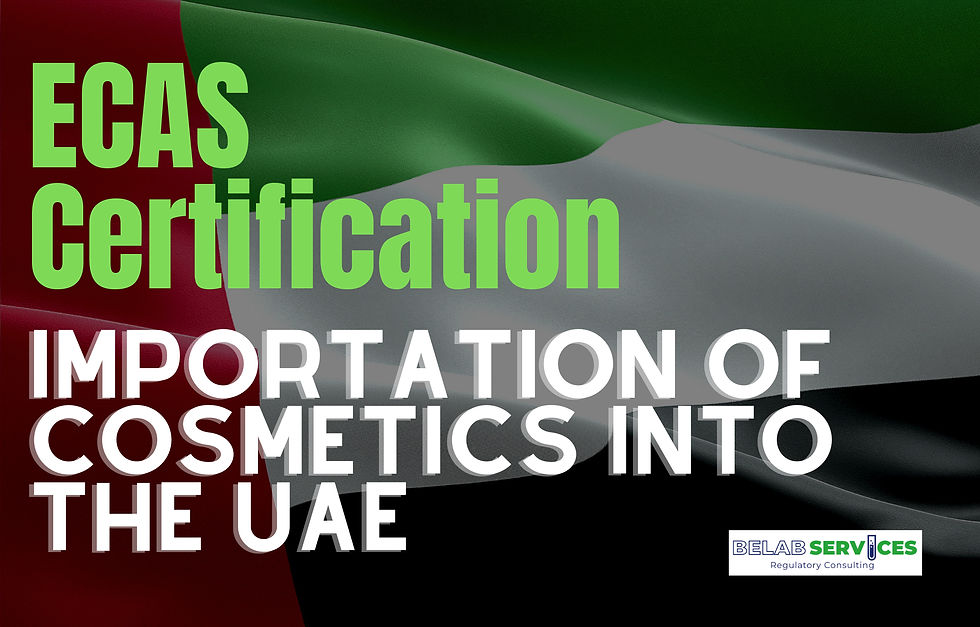This document describes the requirements, the process of obtaining and the importance of the ECAS (Emirates Conformity Assessment Scheme) certificate, required for the import of cosmetic products into the United Arab Emirates . The ECAS certificate ensures compliance with the quality and safety standards set by the UAE federal government and is a mandatory measure for all cosmetic importers in the region.

Introduction
As a hub for trade and consumption of high-quality products, the United Arab Emirates sets strict regulations to ensure the safety and quality of products entering its market.
The ECAS (Emirates Conformity Assessment Scheme), overseen by the MOIAT (Ministry of Industry and Advanced Technology, formerly known as ESMA), is a mandatory certification system that ensures cosmetic products meet federal quality and safety standards in the UAE. This white paper focuses on the fundamentals and process of ECAS certification for imported cosmetics.
Definition and Objective of the ECAS Certificate
The ECAS certificate is a conformity assessment system used to verify that cosmetic products meet UAE standards.
This process involves evaluating the composition, labelling and safety testing of the product, with the aim of ensuring that they do not pose risks to the health of the consumer.
1.1. Background of MOIAT (formerly ESMA)
The Ministry of Industry and Advanced Technology (MOIAT) has taken over the responsibilities of the Emirates Agency for Standards (ESMA) and currently manages the ECAS system. The ministry is tasked with developing and implementing standards and regulations in various sectors, including cosmetics, to promote safety and sustainability in the Emirati market.
Importance of ECAS Certificate for Cosmetics Importation
The ECAS certificate is a mandatory requirement for importing and marketing cosmetics in the United Arab Emirates. Its purpose is to protect public health and ensure that products meet quality specifications.
2.1. Quality and Safety Standards
This certificate ensures that cosmetic products have been evaluated in terms of composition, formulation, purity, labelling and safety testing. This includes specific regulations for permitted ingredients, as well as safety warnings and labelling in Arabic.
2.2. Risk Prevention
The regulation seeks to mitigate risks associated with harmful ingredients, such as banned chemicals and other contaminants. In this way, the certificate guarantees that imported cosmetics do not pose threats to the health of consumers.
Procedure for obtaining the ECAS Certificate

The process of obtaining ECAS certification involves several stages that must be managed precisely to ensure compliance with regulatory requirements. The most relevant steps are detailed below.
3.1. Documentation Evaluation
The importer must submit product documentation, including laboratory test reports supporting the safety and efficacy of the cosmetic. These reports must be in compliance with UAE and MOIAT standards.
3.2. Safety and Quality Testing
Products must undergo laboratory testing to assess aspects such as stability, toxicity and microbiology. These tests must be carried out in laboratories approved by the UAE government or in facilities that comply with international standards recognised by MOIAT.
3.3. Product Registration in the MOIAT System
Once the product has passed safety and quality tests, the importer must register the cosmetic on the MOIAT online platform. This registration includes detailed information about the product, its composition and labelling.
3.4. Certification and Labeling
Once approved, the ECAS certificate is granted, allowing the product to be imported and distributed in the UAE. Products must carry appropriate labelling and, in some cases, the ECAS logo, indicating their compliance with local regulations.
Specific Technical Requirements for Cosmetic Products
Quality and safety standards for cosmetic products include detailed regulations regarding ingredients, packaging, labeling and testing.
4.1. Regulations on Allowed and Prohibited Ingredients
MOIAT has specific lists of prohibited and restricted ingredients in cosmetic products. Ingredients that have been shown to be toxic or potentially harmful, such as certain parabens and phthalates, are prohibited.
4.2. Labeling and Warnings
Products must contain labels in Arabic and English detailing the proper use of the cosmetic, safety warnings, and the complete list of ingredients.
4.3. Validity of the Certificate
The ECAS certificate has a validity period that varies depending on the type of product and must be renewed in accordance with current regulations. This validity ensures continued compliance and allows authorities to carry out periodic checks to ensure compliance.
Conclusion
The ECAS certificate is essential for the import and marketing of cosmetic products in the UAE. It ensures that products meet the quality and safety standards set by the government, protecting consumers and maintaining high levels of quality in the market.
Compliance with this requirement not only ensures the legal entry of products, but also strengthens consumer confidence in the safety and efficacy of cosmetics available in the Emirati market.
References
Ministry of Industry and Advanced Technology (MOIAT). “Import Regulations for Cosmetics in the UAE.” Government of the United Arab Emirates, 2023.
ESMA. "Technical Regulation for Cosmetics and Personal Care Products". Emirates Standards Agency, 2020.
UAE Trade Publications. "Cosmetic Products Importers Guide". Dubai Chamber of Commerce, 2022.


Commentaires